"Some sufferings from that love." Wives of Russian epic heroes
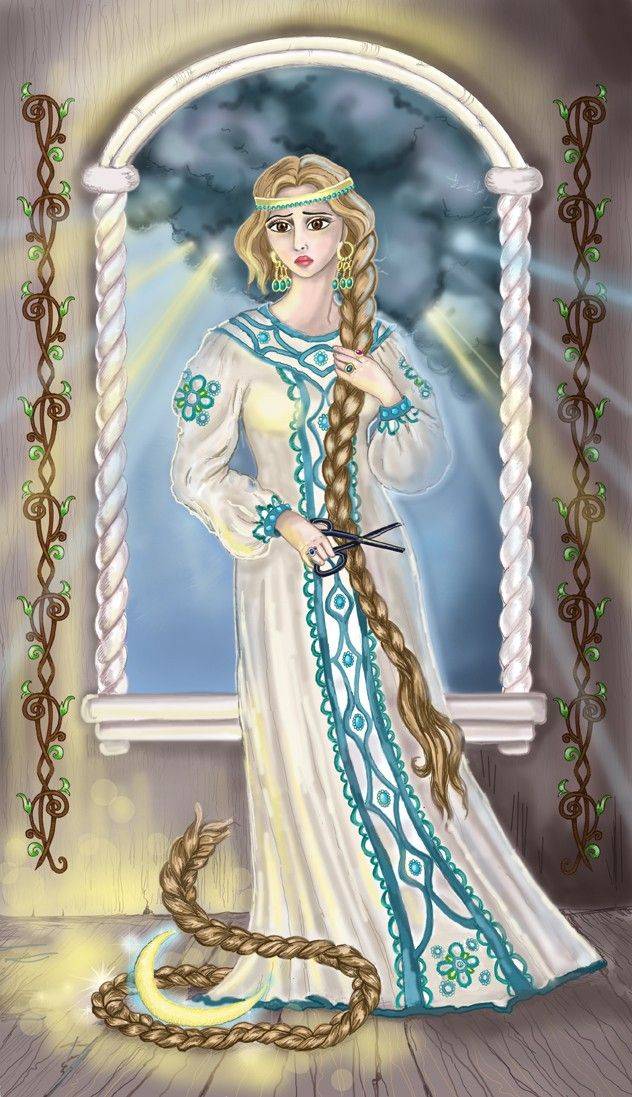
Vasilisa Mikulichna from this epic is also loving her unworthy and boastful husband, and the finale of this stories turned out to be happy, which is rather the exception to the rule. After all, even sincerely loving her husband, a faithful and faithful spouse, in Russian epics sometimes becomes indirectly the cause of his death. The most touching and sad example is “Bylina about Danilov Lovchanin and his wife” (see article “Prince Vladimir against bogatyrs. Intrigues and scandals of the princely court of the epic Kiev ").
But the wives of many other Russian warriors are negative characters. Sometimes it seems that the desire to lime their spouse - almost the only purpose of their life.
Two hypostases of Apraks, wife of Prince Vladimir
Let's start in order, with the wife of the epic Prince Vladimir, who is invariably called Apraksa or Apraxia (Eupraxia). The narrators have a polar attitude Most often, she is an absolutely neutral character, whose function is to sit at a feast next to Vladimir and smile friendly at guests.
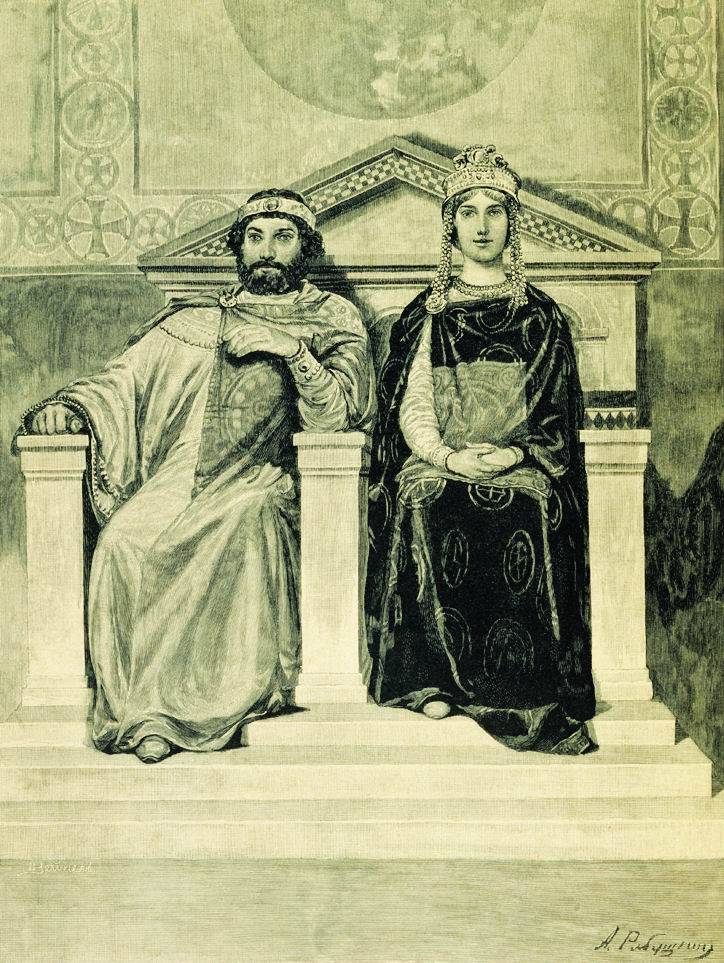
However, in some bylins, Apraksa acts as an intercessor for the heroes before an angry prince; it is she who saves Ilya Muromets who was thrown into the cellar from starvation. Sometimes its wisdom is emphasized. So, choosing a bride, Vladimir voiced one of the requirements for his future wife: "It would be for me, the prince, with whom I would think." In the epic of Stavr, Apraks, the only one in the "Tatar after" learns a woman.
But in other bylina Apraks willingly accepts "signs of attention" from the enemies of Russia. For example, what is said in “Bylin about Alyosha Popovich and the Snake Tugarin:
[quoteHow does Snake-Tugarin go to white-stone chambers,
Yes, it meets Sun Sunny Vladimir Kiev
With my princess with Apraksoy,
He’s our images, Serpent, does not pray,
Prince Vladimir does not hit the brow.
He sits down at the tables of oak and sugar.
Yes, she puts the princess on her knees.
Yes caresses-mercy Apraks Korolevichna.
As the princess will speak here:
- Now and feast and gazebo
With the dear friend Snake-Gorynychem! "[/ Quote]
The alien king Idol Rebellious also has his plans for Apraksu:
I will borrow, I will borrow chambers white-stone,
I only let Aprakseyushku into the wards,
Aprakseyushku light is royal,
And I will send Vladimir to the kitchen ”.
For some reason, this time, the princess does not immediately sit down on the knees of another invader, but bargains for two days to think for herself, but there is no talk of suicide.
"I respect Aprakseyushka, two more days,
In two days you will not be a princess,
You will not live as a princess, but as a tsarina! ”
As a result, in some of these epic entries, Alyosha Popovich and Ilya Muromets are not shy about expressions and “call the trough a trough”, using the appropriate (non-print) word for Apraksa as it seems to them.
Note that Princess Apraks is often called royal. The fact is that this woman seems to have been of Lithuanian descent. In one of the epics, two bogatyrs - Dobrynya Nikitich and Dunay Ivanovich (sometimes Ilya of Murom) were sent by Vladimir to Lithuania in order to marry the royal daughter for the prince. The Danube began its bogatyr service in Lithuania, therefore, knows the local customs and customs, it was probably planned that he would become the main negotiator. But the negotiations did not work. The king, having seen the Danube, asks if he decided to return to the service, and, having received a negative answer, is insulted, calling him a “noblewoman slave”. And the new lord of the Danube, Prince Vladimir, he calls him “the last groom” and the “robber”. The Danube in response is bold, and for this he is thrown into the "deep cellars". The diplomatic mission failed, and Dobryna, in order to fulfill the prince’s assignment and rescue a friend, has to “beat the Lithuanian army”.
Danube Ivanovich and Nastasya
On the way home, it turns out that Apraksa has an older sister, Nastassja, who once had an affair with the Danube (for this reason, the Danube was arrested "for insulting the majesty" and fled from Lithuania to Kiev). And now the hero ignores his former passion. Offended by his inattention, Nastassja overtakes ambassadors in the field and engages in battle with the Danube. Perhaps, in the original version, it was about an ambush, similar to that which the wife of Yaroslav the Wise, Ingigerd, tried to organize, who wished to go to Polotsk to Norman kondotier Eymund (decided that it was too expensive for Novgorod, and would be too dangerous in Polotsk). In the epic, the personal duel of the Danube and Nastasya is described. The Danube wins, Nastasya goes with him to Kiev, where two weddings are played at once - the princely and heroic. A happy ending? Where there: soon pregnant Nastasya will die from the arrow of a drunken husband, who then commits suicide (rushes at the sword) and the Danube River will appear from his blood.
Possible prototypes of Princess Apraksa
But back to the princely palace of the epic Kiev. Some historians have tried to identify Princess Apraks with the wife of the “ancient Vladimir”, referred to in the Ioakimov chronicle:
Especially valuable here is the testimony that Advinda was the heroine of many "old narrations" and "songs."
The second version is striking in its straightforward obviousness: in one version of the epic, Vladimir sent his heroes, including Dobrynya and the Danube, to woo the daughter of the Lithuanian king for him, giving such instructions:
Go for Opraksoy and royal.
And the king will give good, duck you and take good,
And it will not give good - take power. "
The king, as we have already said, does not consider Prince Vladimir to be equal to himself, he refuses to “matchmakers” on the grounds that Vladimir is “a former servant” ... Have you already thought of Polotsk and Rogned? But the fate of the unfortunate Polotsk princess is very much different from the fate of Princess Apraksa of Russian epics.
The third version was proposed by a very well-known and authoritative, but sometimes a little enthusiastic specialist - academician B.A.Rybakov. So, get acquainted, Eupraxia Vsevolodovna, sister of Vladimir Monomakh, better known in Europe as Adelgeida. She could well have become the heroine of the Gothic novel (with an erotic bias), only the action in it will be too far from Kiev.
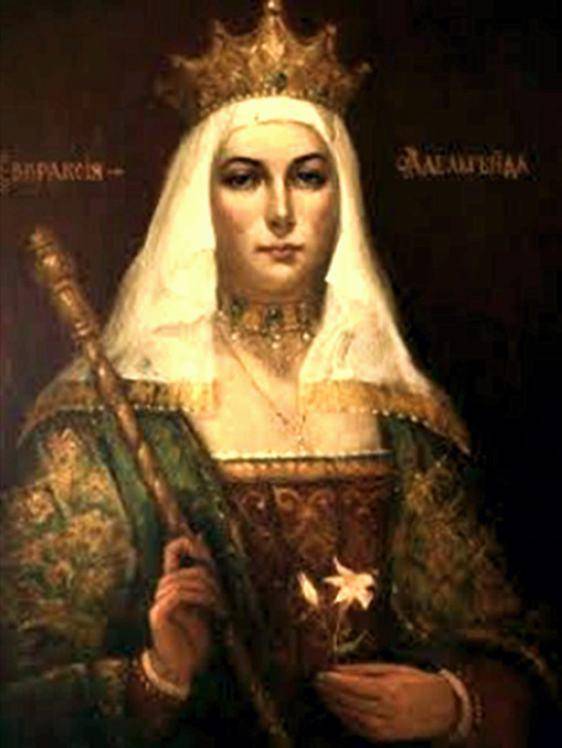
At the age of 12-13, Eupraxia was married to Heinrich Long, Count Staden, before her marriage she was brought up in a Catholic monastery for three years, where she changed her faith and received a new name. The wedding with Heinrich took place in 1086, and in 1087 the husband died. Already in 1088, she became engaged to the emperor of the Holy Roman Empire, Henry IV, which caused displeasure in Kiev (this monarch had a too scandalous reputation, and the term of mourning for her husband was insufficient).
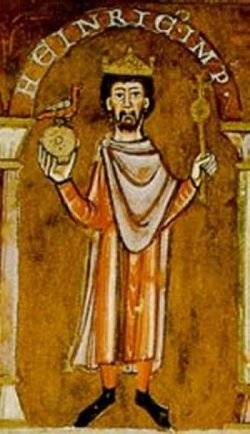
In 1089, marriage between Heinrich and Adelheida was concluded in Magdeburg, and in the same year her coronation took place in Cologne. This marriage turned out to be extremely unfortunate, it all ended with the flight of the former Kiev princess to Canossa, to the famous Matilde of Tuscany, under the patronage of the worst enemy of Heinrich - Pope Urban II.
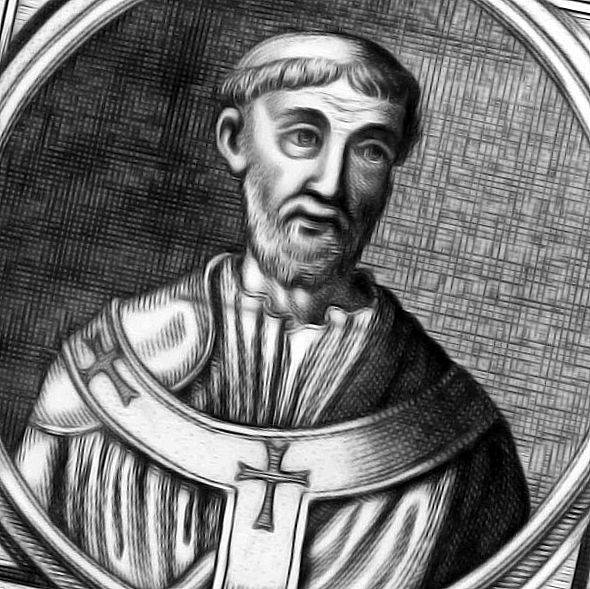
At the cathedral in Piacenza (1095), the fugitive empress accused Heinrich of satanism, a commitment to Nicolaitans heresy, and a penchant for various sexual perversions. The times in Europe were still “dark”, intolerant, therefore, instead of protecting Henry’s rights to freedom to blaspheme, to attend dark masses and the choice of sexual preferences he was subjected to anathema. And Eupraxia, having received complete forgiveness of sins, first moved to Hungary, but at the end of her life she returned to Kiev, where she tonsured into a monastery and died in 1109.
For some reason I like the first version of the origin of the image of Apraksa.
Strange story of Svir's marriage
The story about Svyatogar’s wife seems very unexpected: a girl should have been betrothed to him; a girl will fall near his house, stuck in a beard of golden hair, forged for him by a blacksmith. In the house near which this hair fell, there was only a sick girl whose body was covered with scabies and scabs. In one version of the epic, Svyatogor, struck her, sleeping, with a sword, in a different way - before killing, kissed (at her request). The result was the same in both cases: the opal scab and the girl recovered. In some versions of the epic, Svyatogor always carried her with him. In others, she stayed among the people and became very rich in trade with foreign countries, but she met Svyatogor several times a year when the hero came to her home.
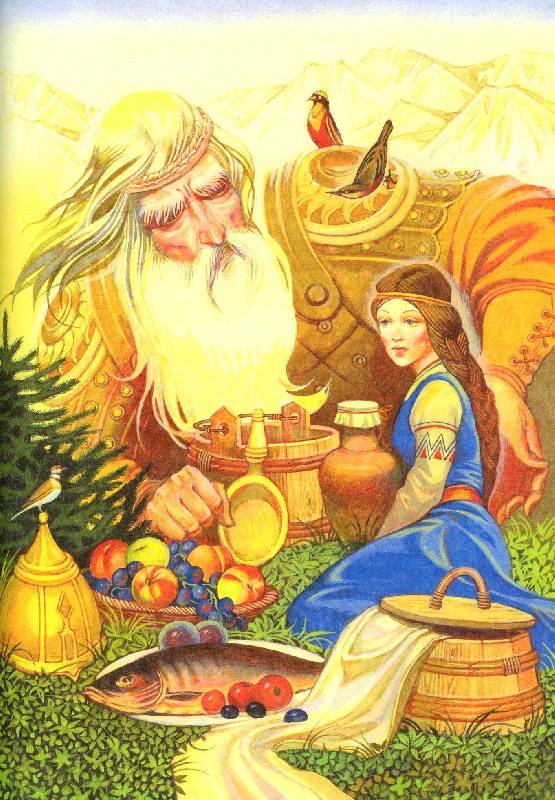
It would seem a very strange couple, but this nameless girl remained at the coffin, in which Svyatogor lay ill-advised, and turned into a rakita, from which the spring flowed from under its roots.
But this is the outer, surface layer of this epic. Proponents of a “common approach” to exploring bylinas made an interesting suggestion that a sick girl, miraculously recovered after a sword strike, symbolizes the non-black earths of Northern Russia, which remained barren until iron tools appeared. And the fact that Svyatogr's wife became rich through trade with overseas countries allowed them to conclude that the Novgorod land was meant.
The most beloved hero of Russia, Ilya of Murom, did not get a wife. But he was not a monk either, and therefore in bylinas there are occasionally indications of Ilya's love relationship with certain “bogatyrs” (for example, Savishna's plain). These stories can sometimes serve as an illustration of the thesis about the perniciousness of extramarital relations, especially if they are made in the territory of a “probable enemy”. The terrible and tragic consequences of one of these “novels” of the bogatyr (with a woman named Zlatgorka or Goryninka) were described in the article The most revered Russian hero. Ilya Muromets
Two attempts of Dobrynia Nikitich
Much more fortunate in this regard is his “cross brother” - Dobryna Nikitich. "The first pancake" he, however, also turned out "lumpy." In the not-so-well-known wide circle of readers the epic “Dobrynya and Marinka” tells about a sorceress whom many researchers consider to be the incarnation of the goddess of death Mara (let's also remember Marya Morevna of Russian fairy tales). In punishment for the crystal mirror broken by the arrow of the hero, she bewitched him, but did not want to answer reciprocate. When Dobrynya began to show perseverance and appeared to her, driving away “Snake-Gorynych's dear friend”, he turned an obsessive boyfriend into a bay tour with golden horns and silver hooves.
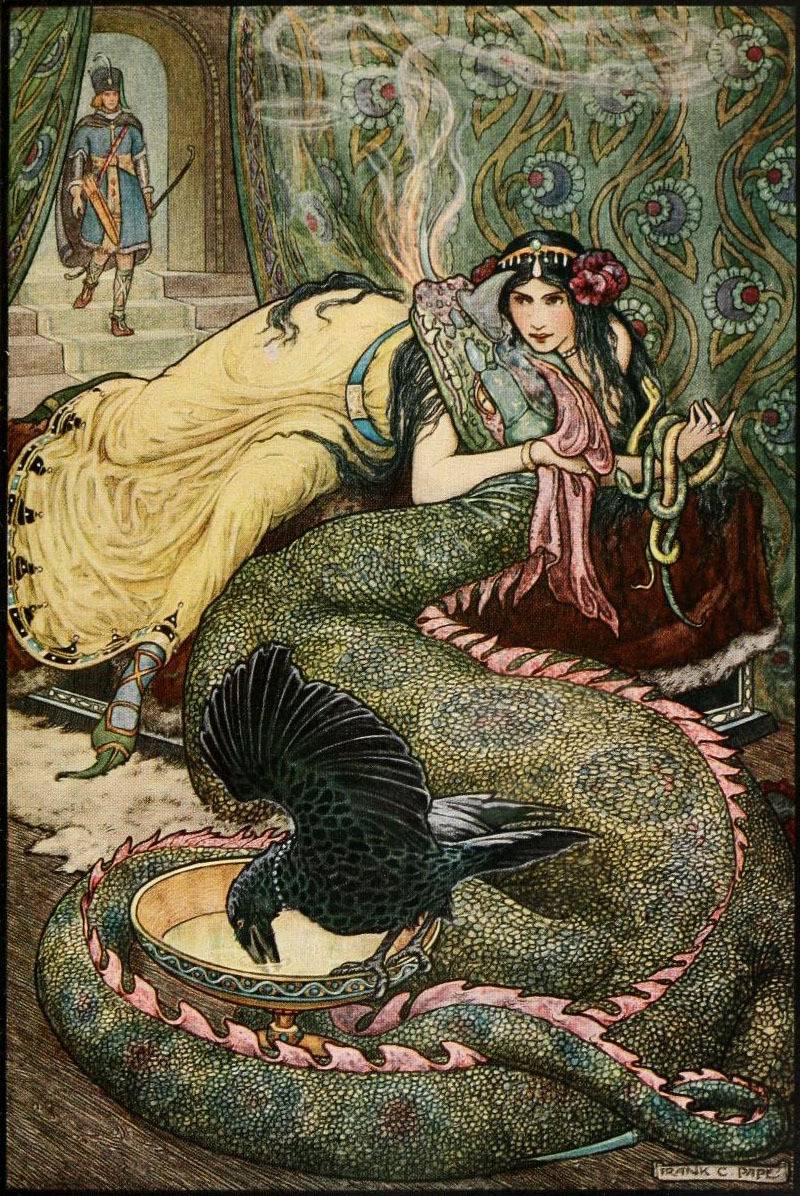
But one day, after drinking “green wine,” Marinka let out what had turned the good youngsters into 10 tours, including Dobrynya. Dobrynia's mother, having heard that
If Dobrynia's mother does not “bluff” and speaks the truth, you will have to admit that she is also a witch - and not one of the last!
Marinka agrees to return to Dobryna the former appearance, but with the condition that he marries her. But after the wedding, Dobrynya cut down Marinka's head, and burned her body.
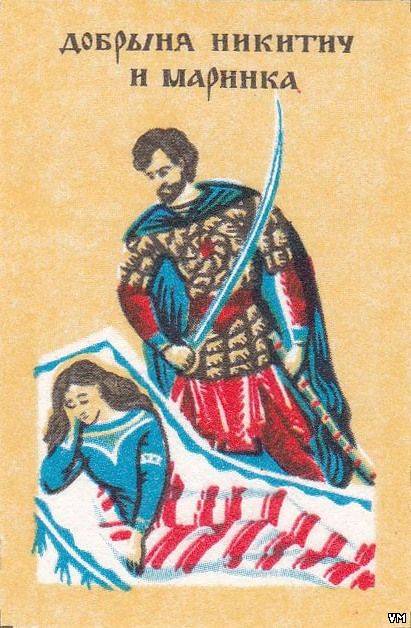
He met his real bogatyr wife Nastasya Mikulichna later - “in the field”.
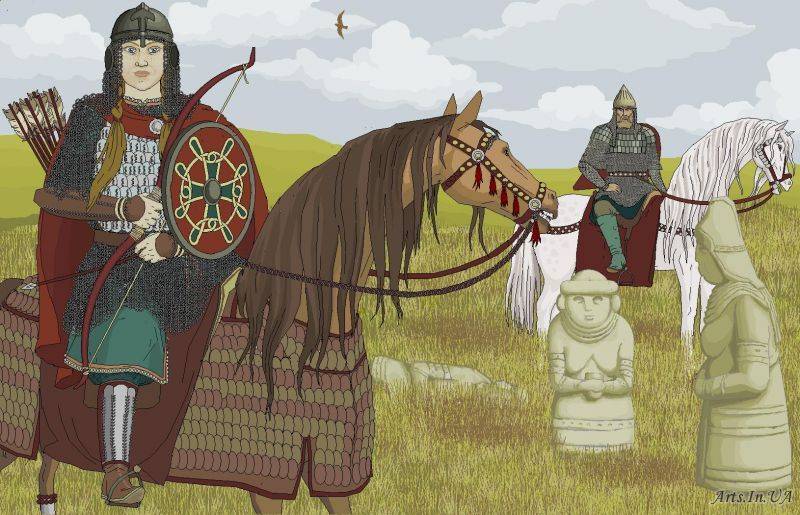
In one of the options, some force keeps him from the fight (the raised hand does not drop). But more often he suffers defeat in battle with her. Sometimes a woman “pulls off” him from the saddle with the help of a lasso (in this case, she is clearly a girl of a nomadic tribe, and she gets the name Nastassja at baptism). Sometimes - pulls off the saddle by the hair (yellow curls). In both cases, it sets the condition: "Do you take, Dobrynya, in marriage, I will let you go, Dobrynyushka, in living creatures?"
In the future, Nastasya somehow loses her heroic strength and appears as an ordinary woman and exemplary wife to the tales listeners. Another famous song (“Alesha Popovich's Unsuccessful Marriage”) tells that, going on a princely assignment to the Horde, Dobrynya asks his wife to wait for his 9 years. Nastasya is waiting for him 12, after which she agrees to marry Alyosha Popovich, who has long been in love with her. Dobrynya returns in time, but for some reason does not declare himself, but comes to their wedding disguised as buffoon. Nastasia recognizes him in this look, and the wedding breaks down.
But Dobrynya himself, as we shall see below, was not a faithful husband, alas.
Scandalous marriage Alyosha Popovich
Alyosha Popovich, so unsuccessfully wooing Nastasya Mikulichna, according to one of the epics, still got a wife, but the story of his marriage is incredibly scandalous and therefore virtually unknown to readers. This song begins with a traditional description of the feast of Prince Vladimir, where the guests (as usual) boast who is nobility, who is wealth, who is young wife. And only the brothers Zbrodovichi (sometimes Petrovichi, Borodovichi) are silent. When the prince himself addresses them, they nevertheless tell about their beloved sister - the Fawn, a modest and beautiful woman who sits in the back room, so that extra people don't see her. Alyosha Popovich laughs at them, claiming that for a long time he and his sister live “like husband and wife”. The brothers, of course, do not believe him, and then he leads everyone to the house of Zbrodovych and throws a little snow-light into the window - it opens up, a long white cloth comes down from it (sometimes Olyon goes out by itself - “improperly dressed”). The angry brothers are going to take the disgraced their sister to the field in order to cut off her head, and then she informs them that the wife of the elder brother is cheating on him with Dobrynia, and the younger spouse is with a kind of Residue. In general, family clashes in the epic went almost like a shameful evening talk show 1 of the Russian television channel. The reaction of the brothers to such news is not reported, but I think that it can be easily guessed. But it is said that Alyosha Popovich comes to the place of the alleged execution and takes Olyonushka to the church for the wedding.
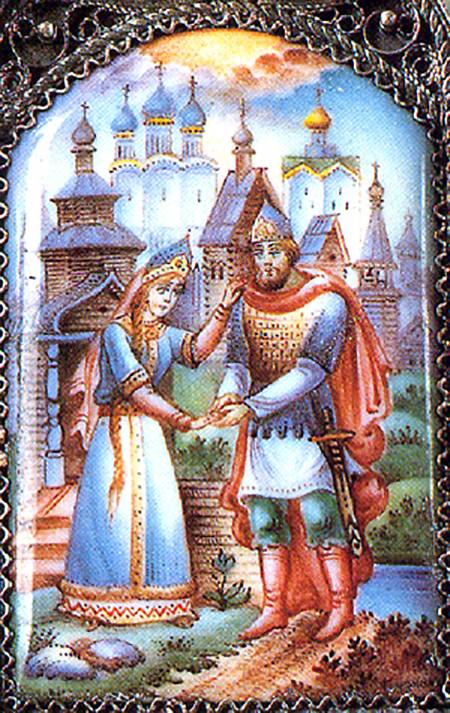
Gullible Michael Potyk and treacherous Avdotya-Swan White
Other warriors with their wives were even worse. About Mikhail Potyka and his wife Avdotya-Belaya Swan were briefly told in the first article of the cycle (Ryzhov V.A. "Heroes of epics and their possible prototypes"). Add that, saved by her husband, who went to her grave (and killed the Serpent in her), she tried to kill him three times. Initially turned into stone - they saved Mikhail Ilya of Murom, Dobrynya Nikitich and the unknown wanderer of Kalika. Then she ordered him to be nailed to the wall - this time he was saved by the daughter of the Lyakhet king Nastasya (well, the narrators love this name, nothing can be done about it). For the third time, the wife is trying to poison Pety (gives the goblet with wine as a sign of reconciliation), but Nastasya, who was nearby, invited him to look at his wounded nails, and he disbelieving this time, kills Avdotia.
Soloman and Solomanida
The hero of Solomon’s wife (in the epic, based on the apocryphal Tale of Solomon and His Unfaithful Wife) proved no better. In the absence of the protagonist, the servant of Tsar Vasily Okulievich Ivashka Povarenin (and sometimes the overseas merchant Tarakashka) seduces his wife Solomanid with rich gifts and takes them away on a ship. Soloman, along with the retinue, goes on a search for her, but goes to the discovered wife alone - and, given to her, is captured by Tsar Vasily. Soloman asks to execute him in the open field by hanging two silk loops on the bar (the insidious wife, just in case, adds a third one, saying that her husband passes the first loop with cunning, the second with wisdom, but the third will not pass). As a last wish, Soloman asks to let him blow on the horn of Turii - the squad comes to the rescue and a treacherous wife, Tsar Vasily and his servant Ivashka are hanged on the gallows prepared for him.
Unsuccessful attempt of Ivan Godinovich
Another hero, devoted to his wife - Ivan Godinovich, nephew of Prince Vladimir. However, given that he forcibly married another bride, this is not surprising. This girl, the daughter of a certain merchant Mitrei, was wooed for “the king of Vahramishcha, Koshchey the Immortal” (“Koschey the Immortal” in this case sounds like a title). In other variants, the fiance's tales are called Odolische Koshchevich or Fyodor Ivanovich with Lithuanian choorobuses. Chernigov, the Liakhovinsky kingdom, the Golden Horde and even India are called the place of residence of the bride by the tales.
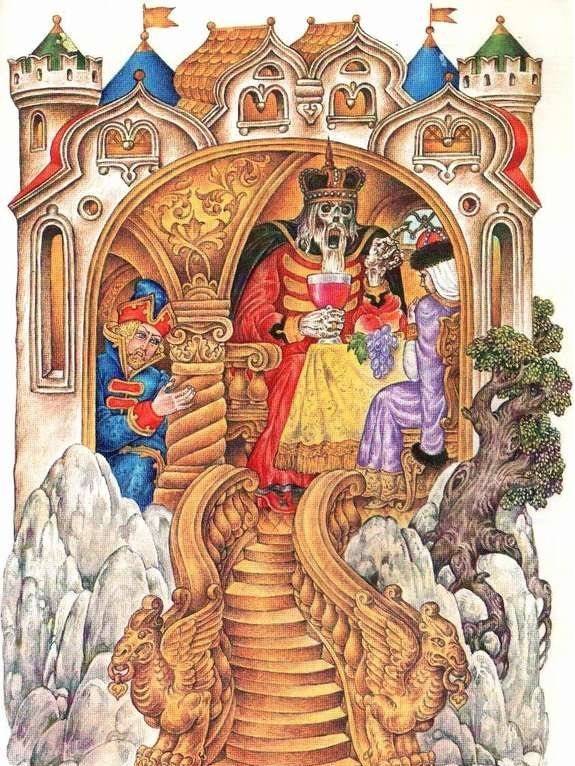
The father of the girl, who (again!) Is called Nastasya, is categorically against the wedding with Ivan:
For you, Ivan give - slave to slave,
Of course revenge, scrape calls.
I have a spliced dog in my yard -
Give for you, Ivanushko Godinovich. ”
But Ivan is smashing his house, rushes into Nastasya Mitreyanovna’s room, which at this time is embroidering a towel for her real groom, and forcibly takes her away, not forgetting to demand a dowry from her parents. On the way to Kiev, they are caught up by Nastasya's fiancé, who calls Ivan to a duel. Ivan wins, but Koschei, who fell to the ground, turns to Nastasya, inviting her to make a choice:
Portomashchitsey Prince Vladimir,
And for me to be you - the queen be. "
Nastasya comes to the aid of Koschey, together they tie Ivan to the oak, and they themselves enter the tent - “amuse”.
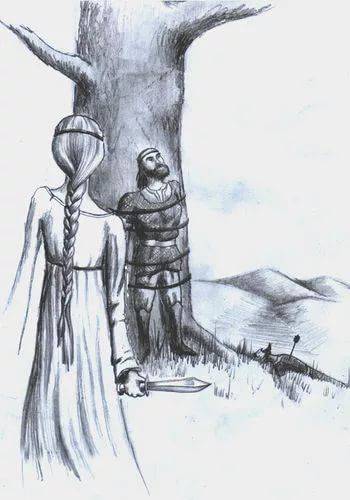
But Koshchei is hindered by two pigeons (two crows in another version) sitting on an oak tree — they, you see, comment on what is happening, claiming that “not to own Nastasya Koschey, to own Ivan Godinovich”. He comes out and shoots them with a bow - the arrow hits the oak, rebounds, and strikes Koshchei himself, who for some reason dies, although he is called immortal. Nastasya allegedly tried to kill Ivan, but her hand trembled and the sword cut the cords. In my opinion, more than a dubious option: the girl probably freed Ivan, having decided that the living nephew of the Kiev prince as a groom was better than a dead king. The liberated “hero” savagely executes his failed wife: she cuts off her hands first, then her legs, lips, and only then her head.
These are the serious passions seething in the married couples of the heroes of the epic Kiev. However, if you look through the pages of the “yellow press” in search of the criminal chronicles, even today, you can probably find something similar.
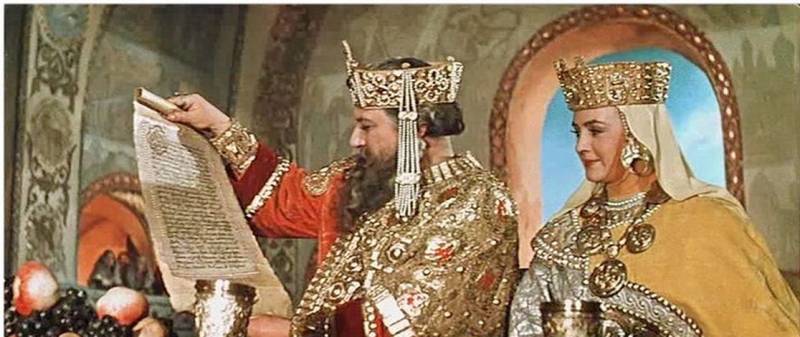
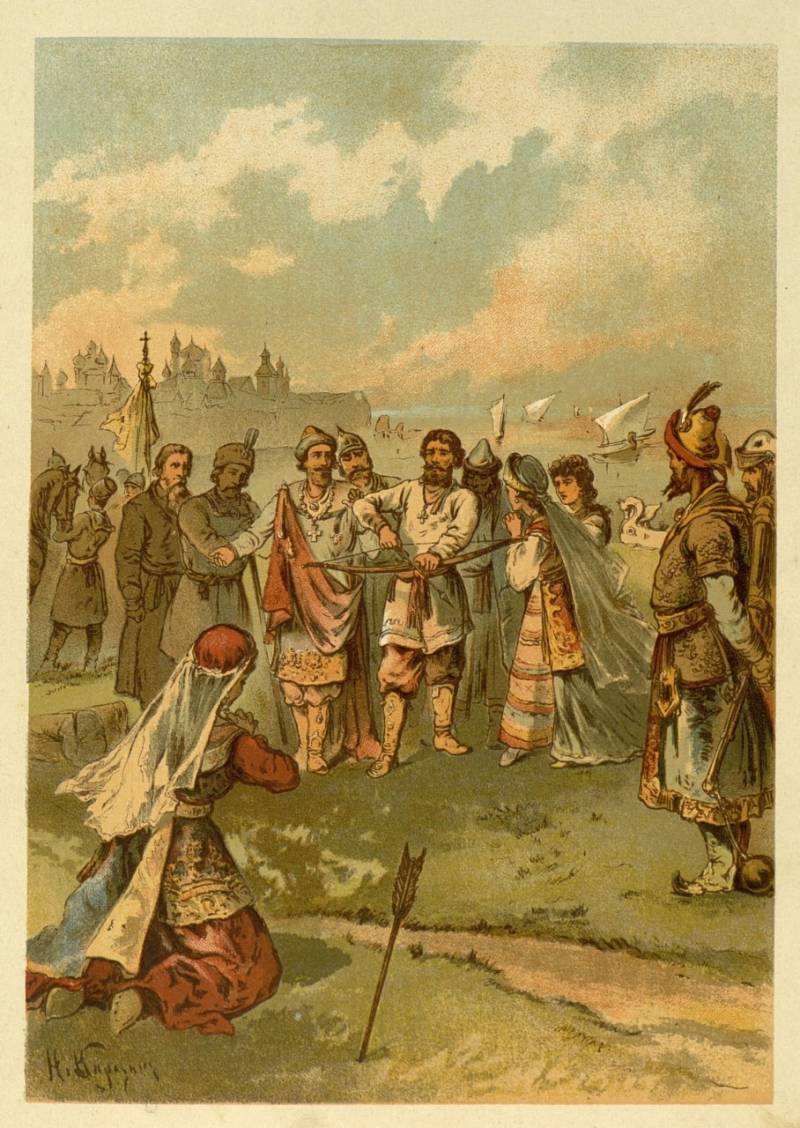
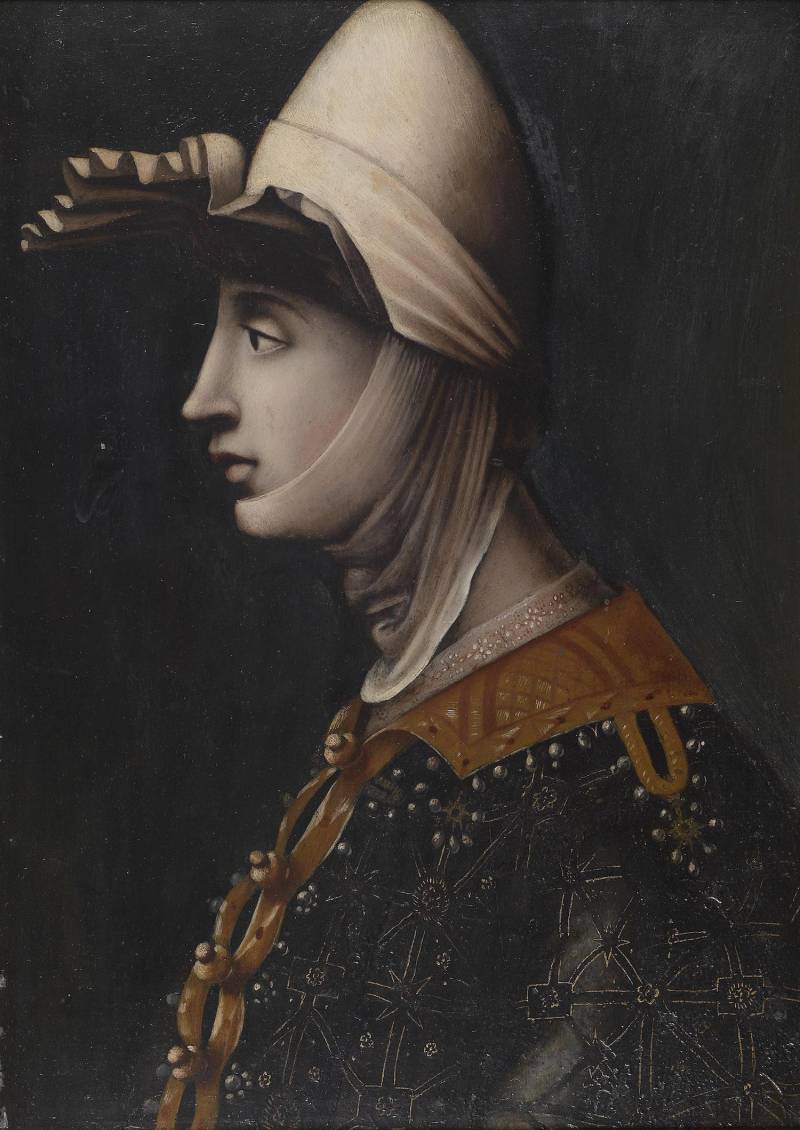
Information